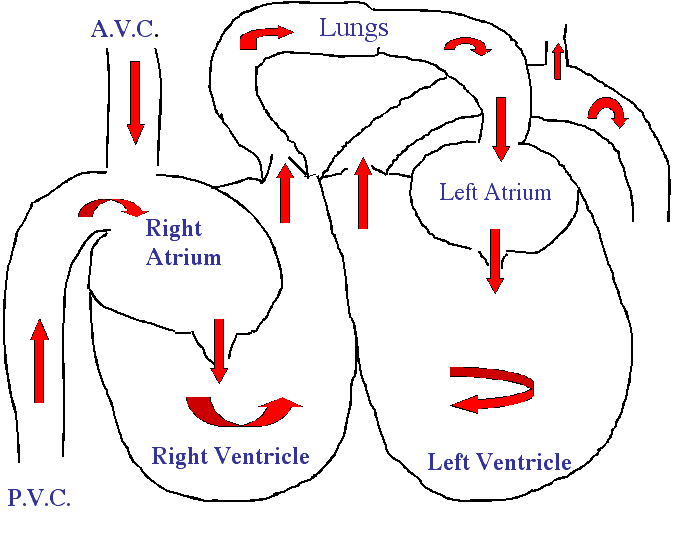Your dog is coughing, and you’re wondering if it could be heart cough? Our iHugDogs veterinarian will explain what coughing has to do with the heart, additional symptoms, treatments, and other causes of coughing.
How Does Heart Cough Develop?
Coughing usually has something to do with the respiratory system, right? Not always – to clarify this question, you should understand a few things about the heart in general:
The heart consists of a right and left atrium and a right and left ventricle. Between the individual “heart chambers” are the heart valves, ensuring that the blood always flows in the right direction. Deoxygenated blood flows from the body through the right atrium into the right ventricle and then through the lung vessels into the lungs. There, it is enriched with oxygen and returns to the left atrium, which pumps the blood into the left ventricle, and from there, it goes back into the general circulation.

With reduced function of the left heart, blood cannot be adequately pumped into the general circulation, and it backs up into the lung vessels. Due to this congestion, fluid from the blood enters the lung tissue, cough receptors are activated, and the symptom of heart cough occurs.
So, heart cough is not a disease but a symptom of an underlying heart condition.
What Symptoms Indicate Heart Cough?
Firstly, heart cough itself is not a disease. Instead, it is a symptom of a heart condition. Other symptoms of heart disease, in addition to heart cough, may include restlessness, faster fatigue during exertion, weakness, and reluctance to move.
My old dog wheezes and breathes heavily – what could it be?
If your old dog is noticeably breathing heavily and even starts wheezing or coughing, you should seek veterinary advice. It could be an allergy or asthma, but it could also have another cause. In any case, behavioral abnormalities should be taken seriously.
My dog constantly clears its throat?
If your dog clears its throat conspicuously often and perhaps also coughs, it should be examined by veterinarians. It may be due to a foreign body, an inflammation, or an infection. Veterinarians then examine the oral cavity, respiratory tract, and esophagus, listen to the heart and lungs, and perform an ultrasound. In any case, treatment is required.
Heart Cough and Additional Symptoms
Heart cough can occur both at rest and during exertion. Besides coughing, there are several other symptoms that may indicate heart disease:
- Weakness
- Reluctance to move
- Rapid fatigue during exertion and walks
- Restlessness
- Increased panting and shortness of breath
- Increased respiratory rate at rest
- Enlargement of the abdomen
Some of these symptoms are not easy to recognize, and one might think they are associated with the normal aging process.
So, if you notice that your dog can’t handle long walks as well as before, remember that this can also be an early symptom of heart disease. If you notice one or more of these signs in your dog, seek veterinary advice.
How Dangerous Is Heart Cough?
In most cases, heart disease develops slowly. Often, a heart murmur is noticed during a routine veterinary examination, leading to further investigations to clarify a heart condition.

Depending on the extent of the symptoms, heart disease, as part of heart failure, can also mean a medical emergency. This is the case, for example, with severe coughing accompanied by difficulty breathing. In such a situation, your dog’s body is no longer adequately supplied with oxygen. In such cases, you should immediately go to a veterinary practice or clinic to save your pet’s life.
What Other Causes Are There for Coughing?
You probably think of lung and respiratory system diseases first when you hear about coughing. And you’re absolutely right; it’s always essential to find out whether it’s heart cough or coughing due to other causes.
The following causes may be behind coughing:
- Parasites, such as lungworms
- Pneumonia
- Asthma
- Bronchitis
- Pulmonary fibrosis
- Foreign body
- Tracheal or bronchial collapse
- Pulmonary thrombosis
- Tumor diseases
How Is the Diagnosis Made?
First, your veterinarian will ask about your dog’s medical history, followed by a clinical examination. Special attention will be paid to the heart and respiratory system.
Of course, it is essential to find out whether the cough is heart-related or not. Heart disease often reveals a so-called heart murmur. This means that the heart sounds change when listened to with a stethoscope. This doesn’t tell us what the problem is; it’s just an indication that something is wrong with the heart. Further diagnostics are needed for clarification.
X-rays:
X-rays can assess whether the lungs show radiological changes. Additionally, the size of the heart is measured, providing clues as to where the problem in the heart could be.

Ultrasound:
In an ultrasound examination (echocardiography), the heart and its function can be assessed in detail. Your veterinarian can precisely identify the location of the problem and assess the extent of the disease. An ultrasound examination of the heart is essential for diagnosing heart disease. Just like in human medicine, there are various specializations in veterinary medicine. An ultrasound examination of the heart is highly specialized and is therefore performed by a veterinary cardiologist. Don’t be surprised if your regular veterinarian refers your pet to a specialist for this examination.
Usually, an electrocardiogram (EKG) is performed simultaneously with the ultrasound examination. An EKG assesses the heart’s rhythm and provides information about possible arrhythmias.
Blood Test:
A blood test cannot diagnose heart disease. However, the biomarker “NT-pro BNP” can provide initial indications of a heart issue.
Depending on other symptoms, a blood test may also be important to rule out other diseases. What disease is behind the heart cough?
There is a range of heart diseases that can be either congenital or acquired. If coughing is the first symptom you notice, and your pet is somewhat older, it is likely an acquired disease.
The most common heart diseases in our dogs include:
Mitral Valve Disease (Mitral Valve Insufficiency)
This affects the mitral valve, located between the left atrium and the left ventricle. Its role is to prevent the backflow of blood into the lung vessels.
When the mitral valve becomes leaky, it is called mitral valve insufficiency. Blood accumulates in the lung vessels, leading to fluid entering the lungs and causing the symptom of heart cough.
Valve changes can result in further damage to the heart, such as heart enlargement, muscle weakness, or arrhythmias.
Dilated Cardiomyopathy
Dilated cardiomyopathy involves congenital or acquired weakness of the heart muscle. The muscle thickness decreases, and the heart becomes stretched, unable to adequately pump blood. This leads to an enlargement of the heart, affecting the tightness of the heart valves.
Which Dogs Develop Heart Cough?
In principle, any dog can develop heart disease with the symptom of heart cough during its life.
Mitral valve diseases, such as mitral valve insufficiency, primarily occur in small and medium-sized dog breeds from around the age of five. These breeds are particularly prone to heart valve diseases:
- Dachshund
- Miniature Schnauzer
- Miniature Poodle
- Cavalier King Charles Spaniel
- Chihuahua
- Pekingese
- Boston Terrier
- Yorkshire Terrier
- Fox Terrier

Cardiomyopathies often develop in young or middle-aged dogs, and it primarily affects large and giant breeds. Breeds that are more prone to heart muscle diseases include:
- Doberman
- Boxer
- St. Bernard
- Newfoundland
- Great Dane
- Irish Wolfhound
Can Heart Diseases Be Treated?
A damaged heart cannot be repaired, but various medications are now available in veterinary medicine to support heart function. If your dog has heart disease, it means giving tablets every day. To make it more pleasant for your pet, you can hide the tablet in some food. Our tasty liver pastes are particularly suitable for hiding tablets.
Different medications have different effects on the heart. The drug Pimobendan supports the pumping power of the heart. Diuretics, such as Furosemide, act as a diuretic, relieving the heart. ACE inhibitors, such as Benazepril, dilate blood vessels, also relieving the heart. Additionally, there are several other medications that can be used for heart diseases. Depending on your dog’s symptoms and the extent of the disease, your veterinarian will choose the right medication.

Your dog will need regular check-ups to monitor the success of the therapy and the progression of the disease. Medications may be adjusted over time to give your four-legged friend the longest, happiest life possible.
In addition to heart medications, you can support your dog with omega-3 fatty acids. These contribute to a healthy heart function. Our salmon oil is rich in omega-3 fatty acids and is also irresistibly tasty.
Can I Prevent Heart Diseases?
Unfortunately, there is nothing specific you can do for preventive measures. Your dog should undergo a veterinary examination at least once a year to detect early signs of heart disease, such as a heart murmur during auscultation. You know your dog best – if you notice early signs, it’s better to call your veterinarian one time too many than one time too few.
What About My Dog’s Quality of Life?
As you have learned, a damaged heart cannot be repaired. Heart diseases progress more or less rapidly, influencing your dog’s life expectancy accordingly.
If your pet is well-adjusted to medication and you regularly attend check-ups, your dog can still have many beautiful years even with heart disease. Enjoy the time together with your dog and shower them with lots of affection and cuddles.


